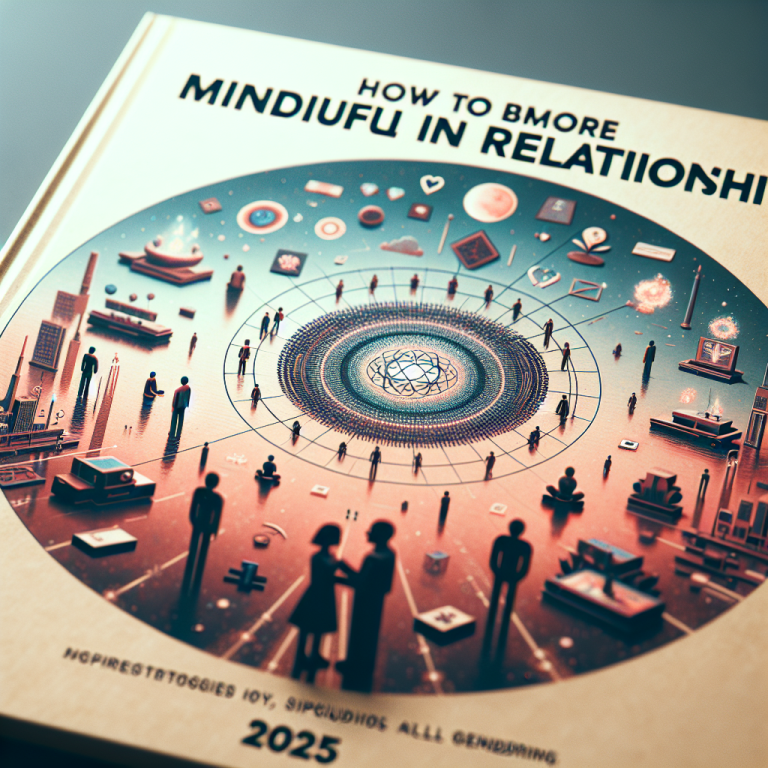How to be more emotionally present in your marriage
After spending years navigating the complexities of relationships, I’ve learned a thing or two about emotional presence in marriage. It’s not just a buzzword; it’s an essential part of building a strong, loving partnership. Let’s dive into five key areas that can help us all be more emotionally engaged with our spouses. Trust me, it’s a game-changer!
1. Active Listening
Understanding the Art of Listening
Active listening is more than just hearing words; it’s about truly engaging with your partner’s feelings and thoughts. When they speak, I focus on them completely—putting my phone down, turning off the TV, and making eye contact. This often leads to deeper conversations where both of us can express feelings we might not otherwise share.
Sometimes, I catch myself thinking of a response while my partner is talking, but I’ve learned to quiet that inner voice. Instead, I nod and respond with verbal cues like “I see” or “That makes sense.” This not only shows that I’m listening but also encourages my partner to continue sharing.
Moreover, reflecting back what I’ve heard can be incredibly powerful. I might say, “It sounds like you felt hurt when that happened.” This not only validates their experience but opens the door for them to dive deeper into how they’re feeling.
Creating a Safe Space for Sharing
One thing I’ve noticed is that the environment in which we communicate matters. To foster emotional presence, creating a safe and inviting space for conversations is crucial. This could be as simple as choosing a cozy corner of the sofa or even taking a walk together.
Sometimes, I initiate conversations during a relaxed moment, maybe over breakfast or while winding down at the end of the day. This setting makes it easier to open up and share feelings without the pressure of a formal sit-down discussion.
It’s important to reassure my partner that their thoughts and feelings are safe with me. I always respond with empathy and avoid jumping to conclusions or judgments. This practice builds trust and encourages more emotional sharing.
Asking Open-Ended Questions
I’ve found that asking open-ended questions can lead to more profound conversations. Instead of asking, “Did you have a good day?” which leads to a simple yes or no, I might ask, “What was the highlight of your day?” This type of question invites my partner to share more personal insights.
When structuring these questions, I try to think about topics that matter to both of us—our dreams, challenges at work, or thoughts about our future together. This not only increases emotional intimacy but also strengthens our connection.
Moreover, I make sure to give my partner enough time to respond without rushing them. Sometimes, I’ll sit in silence after asking a question, allowing them the space to really think and share without feeling pressured.
2. Practicing Empathy
Understanding Your Partner’s Perspective
Empathy is like the backbone of emotional presence in marriage. I regularly remind myself to step into my partner’s shoes before giving advice or opinions. It might sound simple, but truly trying to reflect on what they’re experiencing has made a world of difference.
For instance, when my partner is frustrated, rather than dismissing their feelings with a “You’ll be fine,” I try to express, “I can see why that would bother you.” This acknowledgment not only validates their feelings but strengthens our bond.
Sometimes, I find that my own experiences can be helpful in these situations. Sharing a similar feeling or experience can help demonstrate to my partner that they’re not alone in their challenges, which fosters a deeper emotional connection.
Expressing Understanding Through Touch
Physical touch can be incredibly powerful in conveying empathy. A gentle touch, like holding hands or a comforting hug, can often express what words cannot. When my partner is feeling down, I find that simply being close physically helps them feel supported and understood.
This physical presence creates a sense of safety and reassurance, letting them know that I’m there for them—not just verbally but also emotionally. Sometimes, we sit together in silence, and it’s those moments when I can feel our emotional connection deepen.
Even in moments of joy, physical touch can amplify the happiness we share. A spontaneous hug or a playful nudge often leads to laughter and strengthens our emotional bond, reminding us that we’re in this together.
Reframing Negative Experiences
Life is full of ups and downs, and how we talk about those experiences matters immensely. I’ve learned the value of reframing negative events into opportunities for growth. Instead of focusing on the setback, we discuss what we can learn from it. This approach can turn frustrations into valuable lessons.
For instance, if my partner faces a challenge at work, instead of lamenting about it, we brainstorm solutions together. This teamwork not only shows empathy but also fosters a sense of unity, highlighting that we’re in this life journey as a team.
This practice also encourages resilience. It’s important for us to celebrate the small victories along the way, reinforcing that together, we can overcome hurdles and emerge stronger as a couple.
3. Being Present in the Moment
Minimizing Distractions
I can’t stress enough how crucial it is to create moments of genuine presence. Often, life can get so busy that we forget to be fully engaged with each other. One of the first steps I took was to minimize distractions during our conversations. I often put my phone away and turn off the TV when we’re having important discussions.
By eliminating these distractions, I create a focused environment where my partner feels valued and heard. It also allows me to be more present myself, which in turn nurtures our emotional connection.
In our fast-paced lives, setting aside time for undistracted communication, even if it’s just a few minutes a day, has proven immensely beneficial for us. It helps us reconnect amidst our busy schedules and establishes a routine of emotional awareness.
Engaging in Shared Activities
Finding common interests can significantly enhance our emotional presence. I love setting aside time for activities we both enjoy—be it cooking, hiking, or just binge-watching a series we both love. These shared experiences create opportunities for bonding and engaging in meaningful conversations.
During these moments, I fully immerse myself in the experience. Whether we’re in the kitchen cooking together or enjoying a quiet evening, staying present enhances our connection and keeps the emotional intimacy flowing.
Moreover, trying new activities together can spark excitement and novelty in our relationship, keeping the emotional energy high. Planning regular date nights or weekend getaways has allowed us to maintain that fun and connection in our marriage.
Mindfulness Practices
Incorporating mindfulness has been a revelation for me. Simple practices like meditation or even just some deep breathing can help ground us in the present moment, allowing my partner and me to connect more deeply. These practices benefit our individual well-being and enrich our emotional presence in the relationship.
I often set aside a few moments of quiet time where we focus on our breathing together. This has proven to be a beautiful way to share space and feel connected, releasing the tensions of the day.
Moreover, I’ve noticed that after these mindfulness moments, open conversations flow more easily. We’re both in a clearer headspace to discuss our feelings, making our engagement feel more genuine and relating better to each other’s experiences.
4. Prioritizing Quality Time
Setting Intentional Time Together
Intentional bonding time has started to become a priority in our marriage. Life can get busy, but I’ve learned that carving out intentional time together is critical for staying emotionally connected. This can be as simple as a coffee date or a quiet evening walk.
I make an effort to discuss and plan these moments together, so we both feel invested in our time spent. Setting the date on our calendar creates accountability, ensuring we make it happen despite our busy lives.
Plus, during these moments, I find that we’re more open to discussing our feelings and dreams. It’s almost like creating our little sanctuary where we can be ourselves, away from the hustle and bustle.
Creating Rituals and Traditions
Establishing small rituals or traditions that are meaningful to us has deepened our connection. Whether it’s a Sunday breakfast tradition or an annual trip to a favorite place, these moments strengthen our bond and allow us to anticipate those times together.
For me, these rituals serve as a reminder of what we cherish as a couple. They create lasting memories, intertwining our experiences and stories into the fabric of our marriage.
Plus, the act of participating in these shared traditions sends a signal to each other that our relationship is a priority, reinforcing our commitment to being emotionally present.
Disconnecting from the Outside World
In a digital age, I’ve realized the importance of disconnecting from the outside world to focus on each other. Setting aside time to unplug from our devices allows us to truly engage with one another. We often challenge ourselves to have tech-free weekends, and the benefits are noticeable.
During these times, the conversations become deeper, laughter flows more freely, and genuine moments of connection are abundant. It’s refreshing to prioritize our relationship over social media or emails.
Disconnecting helps us both recharge and recalibrate back to what truly matters—each other. By choosing to be present without distractions, we deepen our emotional connection significantly.
5. Communicating Openly and Honestly
Expressing Thoughts and Feelings Authentically
Open and honest communication is the linchpin of emotional presence. I strive to express my thoughts and feelings authentically, which encourages my partner to do the same. Often, I reflect on how my words can impact them, ensuring that I choose honesty combined with kindness.
By sharing what’s on my mind without fear of judgment, I’ve created an atmosphere where my partner feels comfortable opening up, too. It’s amazing what vulnerability can do for a relationship. We find that being real with each other reinforces the emotional connection.
During tough conversations, I focus on using “I” statements, like “I feel” instead of “You always.” This approach reduces defensiveness and allows for a smoother dialogue where we both feel heard.
Handling Conflict with Compassion
No couple is immune to disagreements, but how we handle conflict can significantly impact our emotional presence. During disagreements, I make a point to keep the conversation respectful and focused on resolving the issue rather than making personal attacks. It’s all about finding common ground.
In moments of conflict, I try to practice patience, giving us both time to process before reacting. Often, when tempers start flaring, I suggest taking a break and revisiting the conversation when we’re both calmer. It’s amazing how this simple act can lead to more constructive discussions.
Moreover, I focus on finding solutions together rather than being right. Collaborating on a resolution reinforces that we’re a team, and it diminishes the emotional distance that conflict can create.
Celebrating Each Other’s Achievements
Celebrating successes—whether big or small—plays a crucial role in maintaining an emotionally present relationship. I make it a point to notice and acknowledge my partner’s achievements, no matter how minor they might seem. This could be something as simple as completing a work project or trying out a new recipe.
By acknowledging these victories, I’m showing that I see and value the effort they put into their pursuits. This recognition reinforces positivity in our relationship, reminding us both that we’re in this together.
Plus, when we celebrate wins as a team, it fosters happiness and strengthens our emotional connection. It’s all about lifting each other up and celebrating life together!
FAQ
- How can I improve active listening in my marriage?
- Improving active listening involves being fully present during conversations. It’s about tuning into your partner’s words and emotions without distractions. Make eye contact and give verbal cues to show that you’re engaged.
- What are some effective ways to practice empathy with my spouse?
- Practicing empathy can be as simple as acknowledging your partner’s feelings and being there for them. Try to understand their perspective without jumping to conclusions, and physical touch can help convey your emotional support.
- How important is spending quality time together?
- Spending quality time is vital for maintaining emotional presence. It’s essential to carve out intentional time to engage in activities you both enjoy, keeping your bond strong while enjoying each other’s company.
- What should I do when conflicts arise in my marriage?
- When conflicts arise, focus on keeping the conversation respectful and avoid personal attacks. Try to handle situations with compassion, give yourselves time to process emotions, and work together towards a resolution.
- How can I create shared rituals and traditions with my partner?
- Creating shared rituals involves identifying activities or routine moments that resonate with both of you, like a weekly date night or celebrating specific anniversaries. Discuss these ideas together and make them a priority in your schedule.
Related Content
- The Ultimate 2025 Guide to What Japanese Women Look for in a Boyfriend (Effective Tips & Strategies)
- How to Love Unconditionally: 7 Powerful Tips for 2025 Success
- How to balance being a partner, parent, and individual
- How to Make Time for Your Partner: 7 Effective Strategies for 2025
- Ultimate 7 Strategies for passport bros and traditional values in 2025










